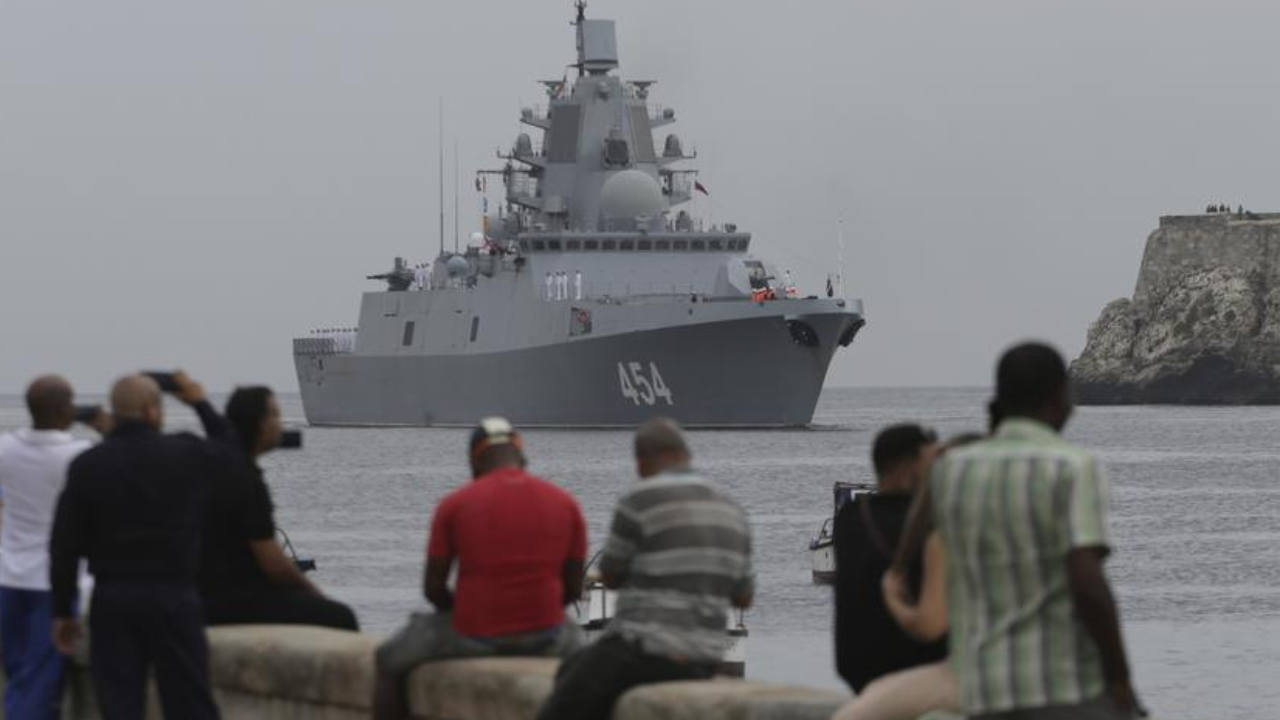Three Russian warships and one nuclear-powered submarine arrived in Havana for naval exercises this week after carrying out what the Russian Defense Ministry called “high-precision missile weapons” training in the Atlantic Ocean. On Friday, in what is being viewed as a response to Moscow’s deployment to the Caribbean nation, a US fast-attack submarine made an uninvited port visit to Guantanamo Bay. Additionally, a Canadian patrol vessel entered Havana Harbor.
Vice Foreign Minister Carlos Fernández de Cossío expressed displeasure with the advent of the American fast-attack submarine Helena in Guantanamo Bay, located some 530 miles southeast of Havana, remarking that “Naval visits to a country are usually the result of an invitation, and this was not the case.” He continued, “Obviously we do not like the presence in our territory (of a submarine) belonging to a power that maintains an official and practical policy that is hostile against Cuba.”
Canada’s Margaret Brooke patrol vessel arrived in Havana harbor hours later in what the Canadian Joint Operations Command dubbed “a port visit… in recognition of the long-standing bilateral relationship between Canada and Cuba.”
The Russian move to send warships to Cuba for training exercises, not uncommon over roughly the last decade, is likely intended as a flexing of Moscow’s military muscle in Washington’s backyard. Tensions have been boiling over NATO’s proxy war with the Kremlin in Ukraine recently. Last month, Washington green-lit Kiev’s strikes on the Russian mainland using US-provided weapons and NATO is preparing to deploy military trainers to Ukraine.
Although Havana and Washington have insisted the Russian warships are not carrying nuclear weapons, despite their ability to do so, the ships are loaded with advanced armaments. The frigate Admiral Gorshkov, the convoy’s lead ship, is “equipped with Zircon hypersonic missiles, which [Russian President Vladimir] Putin has in the past said can fly nine times faster than the speed of sound at a range of more than 1,000km (more than 620 miles). It also carries Kalibr and Oniks cruise missiles,” reports Al Jazeera.
Likewise, the nuclear-powered submarine Kazan is believed to be outfitted with Kalibr and Oniks cruise missiles. The ships are currently docked in Havana port, with residents taking tours of the various vessels. The Russian ships are expected to leave the area tomorrow.
Echoes of the Cold War and, quite emphatically, the Cuban Missile Crisis are being felt today, as Washington and Moscow challenging each other’s spheres of influence, sending warships near each other’s borders. The White House has attempted to downplay the significance of the Russian presence only dozens of miles from the US coast by saying it is merely “routine.” Nevertheless, multiple US navy ships have been ordered to shadow the Russian vessels this week.
This comes after more than a decade of myriad war games launched inside Ukraine, on the Black Sea, and just off Russia’s borders by the US, in some cases jointly with Ukraine or with scores of NATO states. The US military’s activity in close proximity to Russia’s territory is usually far more provocative than this Russian deployment in Cuba.
For example, in November 2021, U.S. Strategic Command’s Global Thunder exercise saw nuclear-capable warplanes and strategic bombers flying within 12.4 miles of the Russian border and simulating a nuclear attack. There had been 30 such flights that month, and according to Russia’s then Defense Minister Sergei Shoigu, American bomber activity near his country’s borders had increased 2.5 times compared to the previous year.
In July 2021, Washington and Kiev hosted the so-called Sea Breeze war games in the Black Sea involving the participation of warships and naval personnel from more than 30 other countries. Just before these drills, a British destroyer caused an international incident by sailing within 12 nautical miles of the Crimean coast. This led the Russian navy to fire warning shots and drop bombs in its path to turn it around. A cache of secret and sensitive British Defense Ministry documents later revealed that this was a deliberate provocation that London had engineered.
In recent weeks, Moscow has made multiple overtures towards peace talks with Washington to end the war in Ukraine along current battle lines. These requests have been flatly denied by the US and Ukraine.
When asked about the message being conveyed to the US by the Russian navy’s activities in Cuba right now, Russian Foreign Ministry spokeswoman Maria Zakharova said “As soon as it comes to exercises or sea voyages, we immediately hear questions and a desire to know what these messages are about.”
She continued, lamenting “Why do only signals related only to our army and navy reach the West?”
Despite Cuba’s long-standing relationship with Ukraine, Moscow and Havana have developed closer ties during the past several years. This is a result of both the Donald Trump and Joe Biden administrations’ tightened sanctions against both countries and the economic pains Cuba has suffered particularly since the Covid-19 pandemic.
This article was originally featured at Antiwar.com and is republished with permission.

































